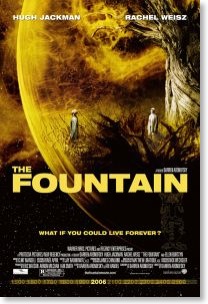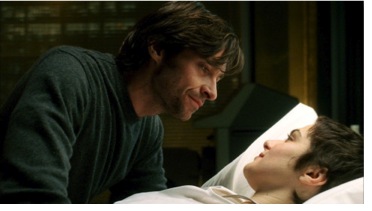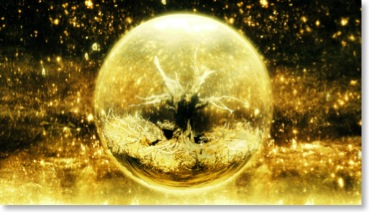The Fountain
11/24/2006 12:14 Filed in: Movies and Television

I was intrigued by the implied promises made in the trailer for this movie back in the summer. The trailer included references to the biblical tree of life, and we saw the principal actors, Hugh Jackman and Rachel Weisz in three time periods: the 16th Century, modern day, and supposedly the 26th century. The viewer might assume that the principal actors--or at least Jackman--had eaten of the Tree of Life and was living an extended life through the next millennium. Not so.
I try very hard in my reviews not to give away major spoilers or surprise plot points, but there's no way to talk about my frustration with this movie without doing so.
Major spoilers below.
The movie opens with the words of Genesis 3:24: "So he drove out the man; and he placed at the east of the garden of Eden Cherubims, and a flaming sword which turned every way, to keep the way of the tree of life." The first scene is of a Spanish conquistador, Tomas, played by Jackman in the Mayan jungles looking for the Tree of Life--a mission commissioned by Queen Isabel, played by Weisz. The movie is not told in a linear fashion, but will continue to weave scenes from all three time periods throughout the story. In the present time, Jackman plays Tommy Creo whose wife Izzy is dying from a brain tumor. Is this the same couple we saw from the 16th century? Evidently not, although their names have connections. And then we see Jackman again in what looks like a futuristic setting where he is in a bubble (yeah, a bubble) with the tree of life floating through space toward the Xibalba nebula, which is also supposed to be the Mayan underworld. In these scenes he is visited by visions of Izzy telling him to "finish it." Oh, and he practices yoga and hugs the tree a lot (literally).

The movie is frustrating because there's too much left for the viewer to decide. I suppose Aronofsky envisions this movie to be some kind of work open to interpretation, but all that leaves is a film that is extremely unsatisfying. I normally avoid reading reviews before I write my own because I don't want to subconsciously borrow from others' opinions. But in this case, I've read about a dozen different takes on the movie because I came home with more questions than I had answers. Incidentally, the best and most complete treatment I've seen of the movie is its article on the Wikipedia.
And after reading all the reviews, all I can determine is that no one else knows what the heck is going on either. One reviewer suggested that the characters in the three eras are reincarnations of the same people. I wonder if he saw the same movie I did? Obviously it's not reincarnation because the 16th century segments are a story written by Izzy. Whether or not the scenes in the bubble take place in the 26th century is anyone's guess because the movie never tells us that. It might as well be a vision of Tommy Creo. Obviously it's the same character from the present time because he has continued on his self-tattoing project that he started during the present day scenes. Plus, there is no futuristic version of Izzy. It's the present day version of Weisz that appears in the bubble from time to time to Jackman's character.

Supposedly, Aronofsky started planning The Fountain after seeing The Matrix in 1999 realizing that it was a genre changing movie like Star Wars and 2001: A Space Odyssey had been before it. He wondered how science fiction would be written after The Matrix and The Fountain is evidently his answer. I don't really consider this to be a science fiction movie although I realize the genre is pretty wide. I've sat in on some film festivals before and I've learned that if a filmmaker introduces his work by saying that the movie is experimental, that's usually code for "it won't make sense to anyone."
My concern is that the few who do go see this based on the trailers will be disappointed. I haven't picked up on any buzz surrounding this movie which, after seeing it, doesn't surprise me. Kathy will tell you it's definitely not a date movie, so be warned. Today both Kathy and I are off work. We slept in late and turned on the television while we ate breakfast. Kathy is the channel flipper in our household (I usually don't care), and she stopped on The View because Jackman and Weisz were both guests promoting this movie. The only scene discussed in the conversation was the "bathtub love scene" which was heavily cut to take the original R-rating to a PG-13. My next statement is not meant to be sexist, but only a acknowledgment that the primary audience of The View is female. After the plug for the movie on today's show, undoubtedly a great number of women will want to see this movie, thinking that it's a love story. I suppose it is a love story at some level, but The Fountain is not going to be what the audience of The View will expect.
I'm sure that some folks will appreciate Aronofsky's movie, and I suppose that some will say they do just to be seen as enlightened. But I can't say that I'm one of them. I'll be glad to watch The Matrix again in the future, but not The Fountain.









